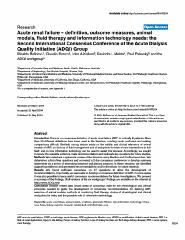Please use this identifier to cite or link to this item:
https://ahro.austin.org.au/austinjspui/handle/1/9791Full metadata record
| DC Field | Value | Language |
|---|---|---|
| dc.contributor.author | Bellomo, Rinaldo | en |
| dc.contributor.author | Ronco, Claudio | en |
| dc.contributor.author | Kellum, John A | en |
| dc.contributor.author | Mehta, Ravindra L | en |
| dc.contributor.author | Palevsky, Paul | en |
| dc.date.accessioned | 2015-05-15T23:01:53Z | - |
| dc.date.available | 2015-05-15T23:01:53Z | - |
| dc.date.issued | 2004-05-24 | en |
| dc.identifier.citation | Critical Care 2004; 8(4): R204-12 | en |
| dc.identifier.other | PUBMED | en |
| dc.identifier.uri | https://ahro.austin.org.au/austinjspui/handle/1/9791 | en |
| dc.description.abstract | There is no consensus definition of acute renal failure (ARF) in critically ill patients. More than 30 different definitions have been used in the literature, creating much confusion and making comparisons difficult. Similarly, strong debate exists on the validity and clinical relevance of animal models of ARF; on choices of fluid management and of end-points for trials of new interventions in this field; and on how information technology can be used to assist this process. Accordingly, we sought to review the available evidence, make recommendations and delineate key questions for future studies.We undertook a systematic review of the literature using Medline and PubMed searches. We determined a list of key questions and convened a 2-day consensus conference to develop summary statements via a series of alternating breakout and plenary sessions. In these sessions, we identified supporting evidence and generated recommendations and/or directions for future research.We found sufficient consensus on 47 questions to allow the development of recommendations. Importantly, we were able to develop a consensus definition for ARF. In some cases it was also possible to issue useful consensus recommendations for future investigations. We present a summary of the findings. (Full versions of the six workgroups' findings are available on the internet at http://www.ADQI.net)Despite limited data, broad areas of consensus exist for the physiological and clinical principles needed to guide the development of consensus recommendations for defining ARF, selection of animal models, methods of monitoring fluid therapy, choice of physiological and clinical end-points for trials, and the possible role of information technology. | en |
| dc.language.iso | en | en |
| dc.subject.other | Acute Kidney Injury.diagnosis.therapy | en |
| dc.subject.other | Animals | en |
| dc.subject.other | Creatinine.blood | en |
| dc.subject.other | Critical Illness.classification | en |
| dc.subject.other | Fluid Therapy | en |
| dc.subject.other | Glomerular Filtration Rate | en |
| dc.subject.other | Humans | en |
| dc.subject.other | Models, Animal | en |
| dc.subject.other | Outcome Assessment (Health Care) | en |
| dc.subject.other | Randomized Controlled Trials as Topic | en |
| dc.subject.other | Renal Replacement Therapy | en |
| dc.subject.other | Sensitivity and Specificity | en |
| dc.subject.other | Urea.blood | en |
| dc.title | Acute renal failure - definition, outcome measures, animal models, fluid therapy and information technology needs: the Second International Consensus Conference of the Acute Dialysis Quality Initiative (ADQI) Group. | en |
| dc.type | Journal Article | en |
| dc.identifier.journaltitle | Critical Care | en |
| dc.identifier.affiliation | Department of Intensive Care and Medicine, Austin Health, Melbourne, Australia | en |
| dc.identifier.doi | 10.1186/cc2872 | en |
| dc.description.pages | R204-12 | en |
| dc.contributor.corpauthor | Acute Dialysis Quality Initiative workgroup | en |
| dc.identifier.pubmedid | 15312219 | - |
| dc.type.austin | Journal Article | en |
| local.name.researcher | Bellomo, Rinaldo | |
| item.grantfulltext | open | - |
| item.openairetype | Journal Article | - |
| item.languageiso639-1 | en | - |
| item.fulltext | With Fulltext | - |
| item.openairecristype | http://purl.org/coar/resource_type/c_18cf | - |
| item.cerifentitytype | Publications | - |
| crisitem.author.dept | Intensive Care | - |
| crisitem.author.dept | Data Analytics Research and Evaluation (DARE) Centre | - |
| Appears in Collections: | Journal articles | |
Files in This Item:
| File | Description | Size | Format | |
|---|---|---|---|---|
| 15312219.pdf | 288.87 kB | Adobe PDF |  View/Open |
Page view(s)
30
checked on Nov 18, 2024
Download(s)
112
checked on Nov 18, 2024
Google ScholarTM
Check
Items in AHRO are protected by copyright, with all rights reserved, unless otherwise indicated.
